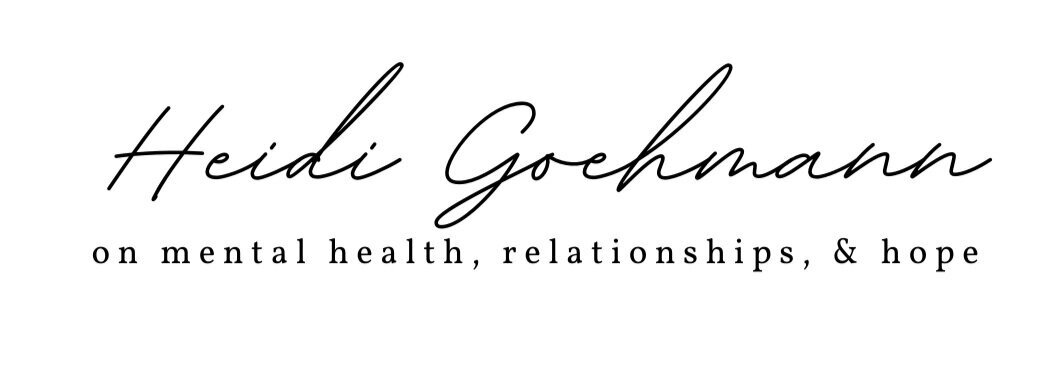Here's My Hallelujah: Hope & Legacy
There comes a time in our lives when we round a bend.
At this bend, we can see in equal parts the journey behind us and the journey ahead of us.
We don’t feel “old” per se, but we start using the term. It’s a nod to our awareness that youth isn’t all there is and time continues marching around the clock at a steady pace outside of our control.
This bend brings to us an awareness: we have our time and place, and there are things—ideas, change, hope, faith, connection—which will outlast our time and place here on this planet.
This bend is known to developmental psychologists as generativity vs. stagnation. Generativity is a fancy word that means awareness of generations to come. There is a time for the here and now, but in our middle adulthood, around ages 40-65, we are intensely aware that our world can be left for the better or for the worse based on what we contribute during our time here. We make moral and ethical decisions, relational decisions, based on whether we care more about this moment in time or more about this moment as well as its place in a string of moments.
Generativity creates change makers. Some of who will change the world, and some of who will change their small corners of it. These are both the good work of God and the good work of generativity.
We might change our unhealthy own habits, our workplaces, our childrens’ insight, our friend’s world, or our neighborhood.
And in doing this, we have left hope in our wake, something lasting when we depart. We have left a legacy.
The alternative to this awareness that the world keeps spinning without you when you are gone is stagnation. Stagnation happens, I think, when we aren’t connected to healthy ways to respond to a broken world, or when the brokenness of the world leaves us feeling so powerless that we stop trying. Stagnation happens when hope is hard to come by and when identity and intimacy and the other stages of development before this one has come to us at a cost, when the trauma of our life and the world around us leaves us bone-weary, tired, and empty. We need someone to reach out to us with Hope, and when we don’t get it, we end up with nothing left to give. Stagnation finds us “stuck” in survival, focused the needs of today. We end up in a place where we can’t even imagine a tomorrow.
Here is some hope-filled legacy to fuel us: The Bible is full of people who have felt the heaviness of a broken world. The Bible has a whole lot of people trying to push through survival mode and more people wondering if they have anything left to give. The Bible wants to address the feelings of lack and depletion that come into our lives. The Bible has grace and kindness and an “Absolutely!” for when we wonder if our tiny time slot on this earth matters at all.
Try these verses on for size if you find yourself in a place of stagnation and survival mode:
Sometimes the world can be daunting. I wonder if our awareness of the brokenness of this world isn’t psychologically supercharged during the second halves of our lives. At this age, many people are raising kids or invested in young people in some other way. We look around and want better for them instead of for ourselves. And adult responsibilities crash in and leave us with limited time and limited capacity. Where do we even start to make an impact? We want to choose well.
Self-awareness is the food of identity. Connection is the food of intimacy. Hope is the food of generativity.
Hope says, “There’s something bigger than you. There’s something bigger than all of this.”
Hope says, “There’s more to the story. There’s more to your story.”
Hope allows us to work … but also to rest, to produce and contribute, but also to play … and to call all of it “legacy.” Hope allows us to lay our attempts and failures, our kindnesses and our contributions at God’s feet and say:
“Here’s my hallelujah.”
“These are for You.”
“Make them beautiful and worthy and powerful.”
And God responds:
“Thank you.”
“I love you.”
“We’re doing this together.”
“Forgiven. Redeemed. Restored. That’s the plan.”
So, whether your contribution in this season is watering the soil of life with your tears or feeding the next generation with your words and actions, or digging into the soil of this land to change it for the better, you have a place here in this world and it matters. These all look like worship and praise and legacy to our God.
Tell me in the comments, what hallelujahs are you leaving, whether happy or hard or heartbreaking? What gives you hope to keep going today in contributing or connecting to the big world out there in need?
We are always growing in the shape, the weight, and the soul of our hallelujahs.
There’s more to this story.
Want to hear more about making a difference, hope, and legacy?
Join me and special guest Dr. Kim Marxhausen for Mental Health Monday Live on the Heidi Goehmann Writes Facebook Page the third Monday of each month at noon CST. Not available for the live discussion at noon, subscribe to the Heidi Goehmann Write YouTube channel to watch the videos anytime. March 15th at noon we’ll be talking about finding our place in the generations of life and bringing hope into the world.
Tune in to the Coffee Hour Podcast from kfuo.org to hear more from Biblical and psychological research on what builds generativity and addressing stagnation. Subscribe here:
Up Next: Mental Health Monday on Hope, Legacy, and Growth & Life in Relationship Podcast Episode - The Benefits of Wonder & Awe


